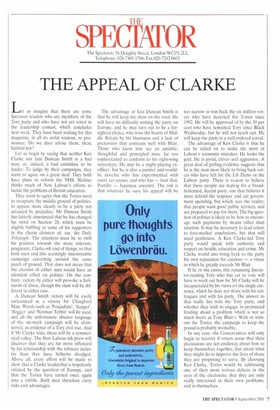THE APPEAL OF CLARKE
Let us imagine that there are some Spectator readers who are members of the Tory party and who have not yet voted in the leadership contest, which concludes next week. They have been waiting for this magazine, in all its awful wisdom, to pronounce. Do we dare advise them, these faithful few?
Let us begin by saying that neither Ken Clarke nor Lain Duncan Smith is a bad man, or, indeed, a bad candidate to be leader. To judge by their campaigns, they seem to agree on a great deal. They both have plans to reform the NHS. Neither thinks much of New Labour's efforts to tackle the problems of British education.
They seem to agree that the Tories need to recapture the middle ground of politics, to appear more clearly to be a party not actuated by prejudice. Mr Duncan Smith has latterly announced that he has changed his mind on Section 28, which must be slightly baffling to some of his supporters in the chaste cloisters of, say. the Daily Telegraph. The intention must be to shift his position towards the more tolerant, pragmatic, Clarke-ish end of things, so that both men end this seemingly interminable campaign curvetting around the same patch of ground. That does not mean that the election of either man would have an identical effect on politics. On the contrary, victory by either will provoke a hailstorm of abuse, though the slant will be different in either case.
A Duncan Smith victory will be easily caricatured as a victory for Chingford Man. Words such as `Poujadiste', 'hanger', 'flogger' and 'Norman Tebbif will be used, and all the unfortunate abusive language of the six-week campaign will be disinterred, as evidence of a Tory civil war. And if Mr Clarke wins, there will be a symmetrical volley. The New Labour-ish press will discover that they are far more offended by his relationship with the tobacco industry than they have hitherto divulged. Above all, every effort will be made to show that a Clarke leadership is hopelessly vitiated by the question of Europe, and that the Tories have turned once again into a rabble, Both men therefore carry risks and advantages. The advantage of lain Duncan Smith is that he will keep the show on the road. He will have no difficulty uniting the party on Europe, and he may turn out to be a farsighted choice, who wins the hearts of Middle Britain by his bluntness and a lack of pretension that contrasts well with Blair. Those who know him see an amiable, thoughtful and principled man, far too sophisticated to conform to his right-wing stereotype. He may be a rugby-playing exofficer, but he is also a painter and wouldbe novelist who has experimented with outré sex scenes, and who has — beat that, Portillo — Japanese ancestry. The risk is that whatever he says, his appeal will be too narrow to win back the six million voters who have deserted the Tories since 1992. He will be approved of by the 30 per cent who have remained Tory since Black Wednesday, but he will not reach out. He will keep the party in a well-ordered corral.
The advantage of Ken Clarke is that he can be relied on to make the most of Labour's economic mistakes. He looks the part. He is jovial, clever and aggressive. A great deal of polling evidence suggests that he is the man most likely to bring back voters who have left for the Lib Dems or the Labour party. There is reason to believe that these people are hoping for a broadbottomed, decent party, one that believes it must defend the taxpayer and cut government spending, but which sees the reality: that people want good public services, and are prepared to pay for them. The big question of politics is likely to be how to encourage such payments by means other than taxation. It may be necessary to lead voters to free-market conclusions, but that will need gentleness. A Ken Clarke-led Tory party would speak with authority and respect on health, education and crime. Mr Clarke would also bring back to the party his own reputation for candour — a virtue in which he greatly exceeds Mr Blair.
If he or she exists, this remaining Spectator-reading Tory who has yet to vote will have to work out how far Mr Clarke will be incapacitated by his views on the single currency, which he does not share with his colleagues and with his party. The answer to that really lies with the Tory party, and whether they wish to engage in protracted feuding about a problem which is not so much theirs as Tony Blair's. With or without the Tories, the campaign to keep the pound is probably invincible.
In any case, the Conservatives will only begin to recover if voters sense that their discussions are not endlessly about how to keep themselves together, but about what they might do to improve the lives of those they are proposing to serve. By choosing Ken Clarke, Tories would be addressing one of their most serious defects in the eyes of the electorate: that they are only really interested in their own problems, and in themselves.


































































 Previous page
Previous page